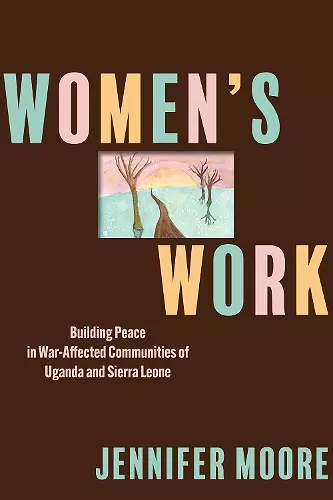Women’s Work
Building Peace in War-Affected Communities of Uganda and Sierra Leone
Format:Paperback
Publisher:University of Pennsylvania Press
Published:11th Mar '25
£31.00
Supplier delay - available to order, but may take longer than usual.

Drawing on seven years of interviews with women activists across communities in Northern Uganda and Sierra Leone, Jennifer Moore shows that when women have full socioeconomic citizenship as well as equitable and respectful partnerships with men, transformative justice can be sustained in postconflict societies.
When women have full socioeconomic citizenship as well as equitable and respectful partnerships with men, transformative justice can be sustained in postconflict societies
In Women’s Work, Jennifer Moore presents a reimagined theory of peacebuilding and transformative justice based on the experiences and insights of women farmers and microentrepreneurs who lived through protracted civil conflicts, drawing on seven years of interviews with women activists across ten communities—five in the Acholi region of Northern Uganda and five in the Moyamba and Koinadugu Districts of Sierra Leone. Despite the important differences between the preconflict and conflict histories and demographics of the two countries, Moore finds commonalities in the practical, yet visionary, approaches to community life emerging from the core values, daily activities, and long-range goals shared by rural cooperative members in both regions.
Collective survival, communal healing, and conflict resolution define the rhythm of these women’s daily lives as they go about building peace, piecemeal. They reject punitive retribution models and demand, instead, a peacebuilding model that advocates for advances in material well-being, the acknowledgment of state accountability for community suffering, and reconciliation and restoration of community networks. But most important, Moore amplifies these women’s voices when they insist that legal equality for women and healthy partnerships between women and men are also essential components to enduring transformation of their societies.
Moore theorizes what peacebuilding look like if it were modeled on these women-led, matriarchically structured communities that proved not only to be effective at holding governments accountable but also to have the capacity to feed their people and revitalize their local economies. Women’s Work shows that when women have full socioeconomic citizenship as well as equitable and respectful partnerships with men, transformative justice can be sustained through the arts of collective livelihood, violence-free conflict management, and celebration.
"At a time when war-affected girls and women in Africa are sidelined, jeopardized, and forgotten, Jennifer Moore’s book, Women’s Work, could not be more relevant. Carefully written, the book reflects a genuine, honest, and innovative engagement with war-surviving women in Uganda and Sierra Leone. Moore’s critical analysis, unparalleled ethical-research approach, and inclusive knowledge-sharing with rural communities transcend conventional paradigms, transforming ideals of motherhood, empowerment, and justice into indelible peacebuilding efforts." * Veronica Fynn Bruey, editor of Patriarchy and Gender in Africa *
"Women’s Work is required reading for anyone interested in feminist theory, transformative justice, criminal punishment abolition, or TWAIL (Third World Approaches to International Law). Jennifer Moore brings an all too rare scholarly humility to her years of deep engagement with women she calls ‘peacebuilders’ in Northern Uganda and Sierra Leone—women who daily seek to build back their lives and communities after catastrophic armed conflict and its ongoing penumbra of economic hardship and violence." * Laura E. Gómez, author of Misconceiving Mothers: Legislators, Prosecutors and the Politics of Prenatal Drug Exposure *
ISBN: 9781512827279
Dimensions: unknown
Weight: unknown
312 pages